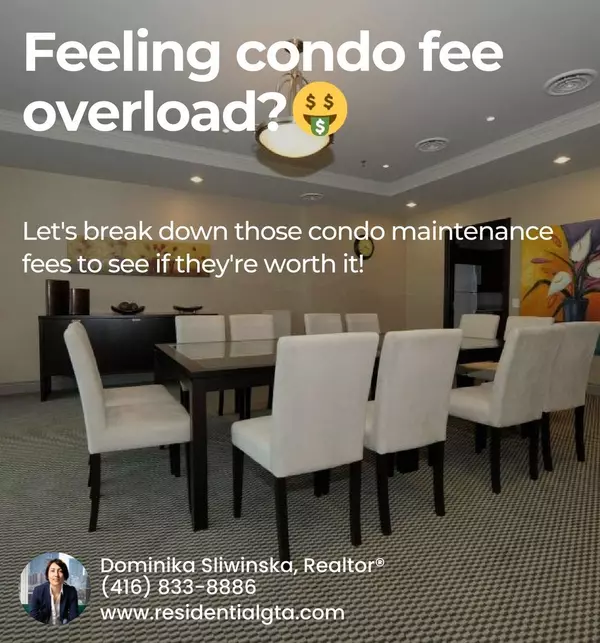Why Condo Fees Could Save You More Money Than You Think!
When considering a move from a condo in Toronto to a house in the suburbs, many couples might be put off by the idea of altering their regular condo fees for unpredictable home maintenance costs. It’s easy to see why: condo fees are a clear, set monthly expense, while maintenance for a house can be much less predictable. But what if those condo fees could actually save you more money in the long run? This blog will dive into the costs associated with both living in a condo and owning a home, offering expert insights to help you make an informed choice.
Condo Fees: What Do They Cover?
Condo fees are a recurring monthly expense that covers several aspects of living in a condo, such as:
1. Building Maintenance and Repairs: This includes everything from the roof to the lobby, ensuring common areas are always in good shape.
2. Utilities: Often, your condo fees cover utilities like water and garbage disposal.
3. Amenities: Gyms, pools, and other facilities are usually part of the package.
4. Insurance: Covers the building structure and common areas, but not individual units.
5. Reserve Fund: Money set aside for large future repairs or emergencies.
Home Maintenance Costs: What To Expect
Owning a house comes with its own set of maintenance costs, which can vary greatly. These expenses might include:
1. Regular Maintenance: Lawn care, gutter cleaning, and HVAC servicing.
2. Repairs: Roof repairs, plumbing issues, or fixing a broken window.
3. Utilities: Separate bills for water, gas, electricity, and garbage disposal.
4. Homeowner’s Insurance: Often more expensive than condo insurance since it covers more.
5. Unexpected Costs: Emergencies like a burst pipe or a sudden termite infestation.
Comparing The Costs
Predictability vs. Uncertainty
One of the biggest differences between condo fees and home maintenance costs is predictability. Condo fees are usually fixed, offering a clear monthly expense that you can easily budget for. On the other hand, home maintenance costs can be unpredictable. While you might not spend anything one month, the next could bring a hefty repair bill.
Example: Sarah and Mike, a couple living in Toronto, pay $500 per month in condo fees. They decided to move to a house in the suburbs where their maintenance costs averaged $450 a month but had months when they needed to spend $1,200 on major repairs.
Long-Term Savings
While condo fees may seem high upfront, they often include savings that aren't immediately obvious. For instance, consider the costs of amenities. Gym memberships, pool maintenance, and other facilities can add up if you were to pay for them separately.
Example: The condo Sarah and Mike lived in had a gym and pool included. If they were to move to a house, they'd have to spend an additional $60 per month for a gym membership and possibly even more for pool access.
Group Bargaining Power
Condo associations usually have the advantage of purchasing power, allowing them to negotiate lower rates for services like garbage disposal, lawn care, and maintenance repairs. This cost-saving is passed on to the condo owners. Homeowners, on the other hand, generally pay full price for these services.
Actionable Steps for Couples in Toronto
Do a Cost Analysis
Before making any decisions, list down all the costs associated with both condo living and homeownership. Include mandatory as well as optional expenses like amenities and services.
Consult with Experts
Speak with real estate agents who specialize in helping couples transition from condos to houses. They can provide personalized advice and help you assess which option is more cost-effective.
Plan for Emergencies
If you decide to move to a house, create an emergency fund specifically for home maintenance. Aim to save at least 1% of your home’s value annually for repairs.
Example: For a home valued at $500,000, you should aim to save $5,000 a year for maintenance and repairs.
Consider Resale Value
Homes in good neighborhoods with low yearly maintenance costs tend to appreciate better, making them a good investment. Similarly, well-maintained condo buildings with comprehensive facilities can also hold or increase their value.
Conclusion
The decision to move from a condo to a house is a significant one, and understanding the financial implications is crucial. Condo fees might seem like an added burden, but they provide a level of predictability and savings on shared amenities and services that can ultimately save you money. On the other hand, homeownership offers more control and potential long-term savings if managed wisely.
In the end, the choice hinges on your specific lifestyle needs, future plans, and financial situation. Taking the time to assess all costs and seek expert advice will ensure that you make the best decision for your future. Whether you stay in Toronto or move to the suburbs, planning and thorough consideration will make your transition as smooth and financially sound as possible.
Categories
Recent Posts










